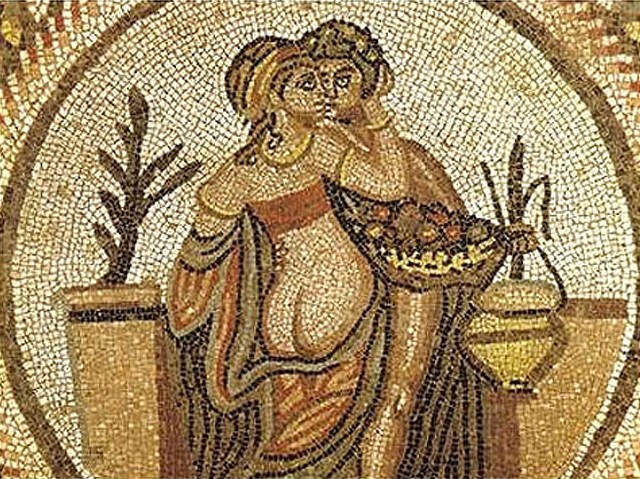“No means no,” as a slogan made popular in recent years, stresses the importance of consent in sexual contact. For some, it might seem like it states the obvious. In reality, some men are still struggling to understand what that type of consent means for the nuances of the courtship rituals they’re used to. For thousands of years, no, in the context of flirtation, usually meant the exact opposite. As women are, for the first time in history, rewriting the rules of courtship, redrawing the boundary lines and redefining consent, many men are confused about the rules of the game. Some are even wondering if #metoo activists are killing the art of courtship altogether. How did we get here? Why does it help that both camps understand the historical background to have a balanced conversation? A notorious book from ancient Rome could help.
Two thousand years ago, Ovid, the famous Roman poet wrote the following in one of the earliest books to advise on “flirtation tactics” titled Ars Amatoria, or The Art of Love:
If we males unanimously agreed
Not to move first, females, crushed, would take the lead.
In lush fields the heifer moos to the bull, the mare
Whinnies at stallions in the open air;
Men’s sex-urge is less primitive, less raw,
Our lust is bound by the limits of the law. 1Ovid, The Art of Love, trans. James Michie (New York: Modern Library, 2002), 21.
The Roman law criminalized rape. But, as will be shown below, Ovid encouraged men to be sexually forceful. Keep in mind that “date rape,” just like “marital rape,” did not exist until the twentieth century! For centuries, it was understood that a woman who submits emotionally to a man, in the context of courtship, seduction or marriage, has already also implicitly given herself physically to him too. Her will and consent in that case becomes irrelevant.
Understanding what constitutes “forced sex” was always more complicated by the fact that women were culturally trained to resist, otherwise they’d be acting shamelessly. Normally prostitutes were the ones who’d offer sex or take a leading role in bed. “Modest” women were expected to be timid and, to some extent, resistant. Again, from The Art of Love:
She may struggle at first and call you a sinner,
But she doesn’t really want to be the winner.
Only take care not to cause her soft lips pain
With your raids—she mustn’t be able to complain
That you’re so rough you bruise.
Men deserve to lose
The points they’ve won already if they snatch
The foreplay kisses and fail to clinch the match.
After all the kissing, how far away
Were you from …? Ah, you were clumsy rather than shy, I’d say.
Some force is permissible—women are often pleased
By force, and like what they’re giving to be seized.
The girl whose citadel is stormed
By sheer audacity feels warmed,
Complimented; the one who could have been attacked
And taken by force but escapes intact,
Although she affects to look glad,
Feels let down, a little sad. 2Ibid., 47.
The “love guru” shockingly tells men that women are disappointed if they’re not taken by force. It should be noted that even though he, like countless others, before and after him believed that “women like it that way,” he still thought that the male lover should stop eventually if female resistance is strong enough that it’s actually successful. That’s where he drew the line:
But if you find your pleas only produce disdain,
Stop, take a step back, think again.
Many women desire what eludes them and hate to be pressed;
Play it coolly, hold their interest.3Ibid., 51.
Ovid takes more than the first half of the volume detailing all tips, tactics and tricks to court women, then when he turned to give advice to women, he told them to resist and turn away! He recommended that women stir men’s jealousy and play “hard to get” on them:
Lock him out, let him camp rough
Outside your door (“oh, cruel door!”) and plead
And threaten till he’s blue in the face. Men need
Variety, we all enjoy
The jolt of bitter flavours; sweet things cloy;
Sometimes a skiff’s upset by favouring winds:
That’s why a woman often finds
Her husband’s ardour falling below scratch—
He has too easy access, the key of the latch.
[…]
A game horse performs best in a race
When the field’s ahead of him, and he has to chase
And overtake. Resentment fans a failing fire—
I myself, I confess, can only feel desire
Under the stimulus of some hurt.4Ibid., 153-155.
That “hard to get” trick was not some fantasy in the minds of men. It was real for generations. A woman was always taught that making herself available cheapens her, devalues her. Elder women, even mothers, taught brides to interact in a similar way, before and after marriage. “Let him beg a little.” Say no, while you mean yes. Resist his advances even if you desire him. Bring that tough conqueror to his knees before he could get between your legs! For a woman, who lives her whole life in the shadow of another man (father, brother or husband), that was a brief moment of victory in bed to take pleasure in.
In the arena of courtship, men were trained to be the hunters while women were the hunted. Men were developed to assume the role of the fighter, the fisherman and the tamer. To the hunter, a woman is the prey. To the conqueror, a woman is the prize. Ovid’s words in the final part of The Art of Love, addressing women, show how society always viewed the two genders as competing and warring camps. He compares men to the Greek soldiers and the female side to the Amazons, whose leader was Penthesilea:
Having armed Greeks against Amazons, I must now prescribe
Weapons, Penthesilea, for you and your tribe. 5Ibid., 111.
Men were brought up on the view that they were competing with one another for women, and also fighting against, and for, women themselves. Women, after all, did not know what was best for them!
Ovid’s writings in The Art of Love demonstrates one of the many ways women were historically victimized. They were instructed to give mixed signals. Women were emotionally developed to behave like they were both available and unavailable, simultaneously accessible and inaccessible. Hence, generations of men misjudged women’s body and verbal language. Indeed, men mistreated women for thousands of years but to disregard the role of culturally-ingrained confusing signals and their effects on them across history would be unjust to both sides.
You might also like:

Ovid’s Art of Love: How to seduce and manipulate him with sex
Ancient controversial advice: Why you should play tricks on him and when to offer your body as a “thank-you”
BOOK: THE ART OF LOVE

Ars amatoria: Controversial advice on love, sex and date rape from ancient Rome
Why The Art of Love by Ovid was repeatedly censored: burnt in Florence, banned in England and seized in the U.S.?
BOOK: THE ART OF LOVE
Endnotes





